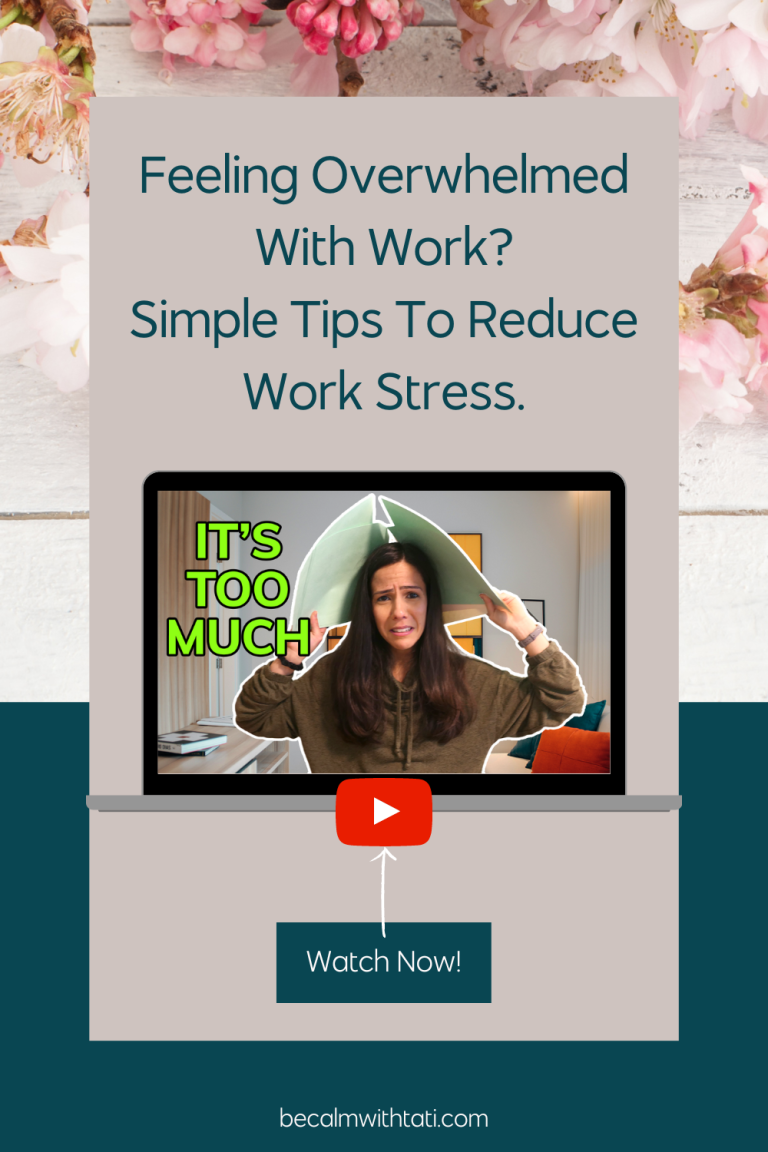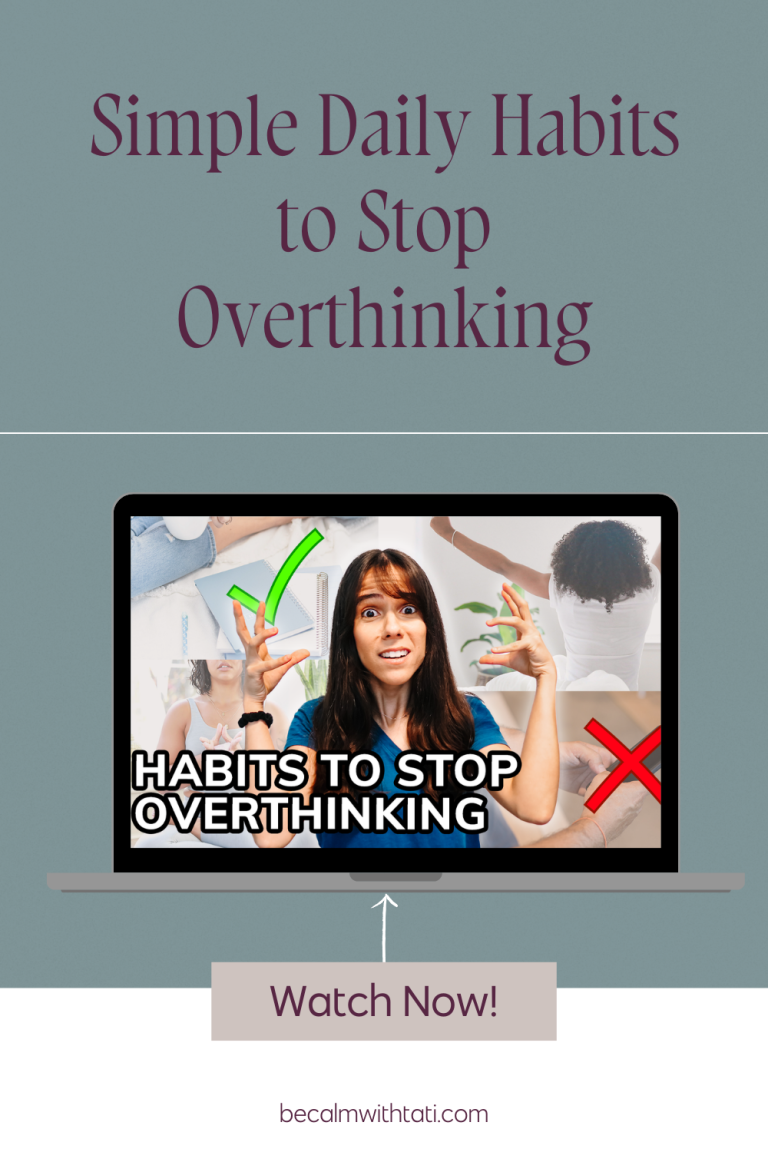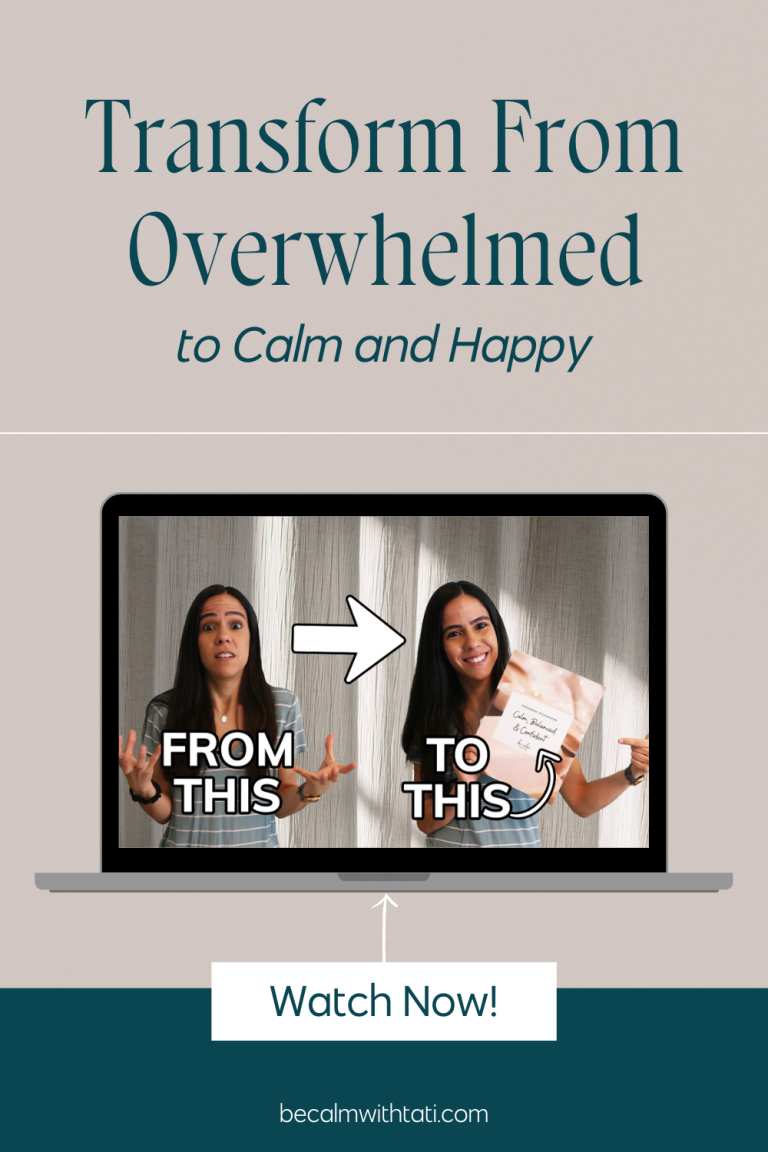If you’re feeling overwhelmed, you’re in the right place. Overwhelm can be triggered by a high workload, emotional stress, life transitions, information overload, and perfectionism, just to give a few examples. In today’s episode, I’m going to share practical tips and insights to help you navigate those intense feelings of overwhelm, regain your balance, and find your calm. So, grab your favorite drink, take a deep breath, and let’s dive in.
In this episode, you will learn:
- The importance of identifying triggers for what is causing you overwhelm
- 7 practical tips to reduce feelings of overwhelm
- Motivating words to help you get through this tough period of time
Mentioned in episode:
The Truth Behind Why You’re Overwhelmed: https://www.becalmwithtati.com/why-youre-overwhelmed/
5 Minute Journaling Trick For Anxiety & Overwhelm: https://www.becalmwithtati.com/journal-for-anxiety/
LISTEN NOW:
🎧 CLICK HERE TO LISTEN TO CALMLY COPING WHEREVER YOU LISTEN TO PODCASTS
WATCH NOW:
📚 Check out Shortform and get a free trial and 20% discount at www.shortform.com/tati
FREE TRAINING: Achieve A Calm Mind, Balanced Life, & Empowered Confidence in 90 Days
If you want to learn how to take back control of your life so you can feel calmer and more confident, and learn the tools to spend your time according to what matters most to you (no matter what your schedule is like right now)…
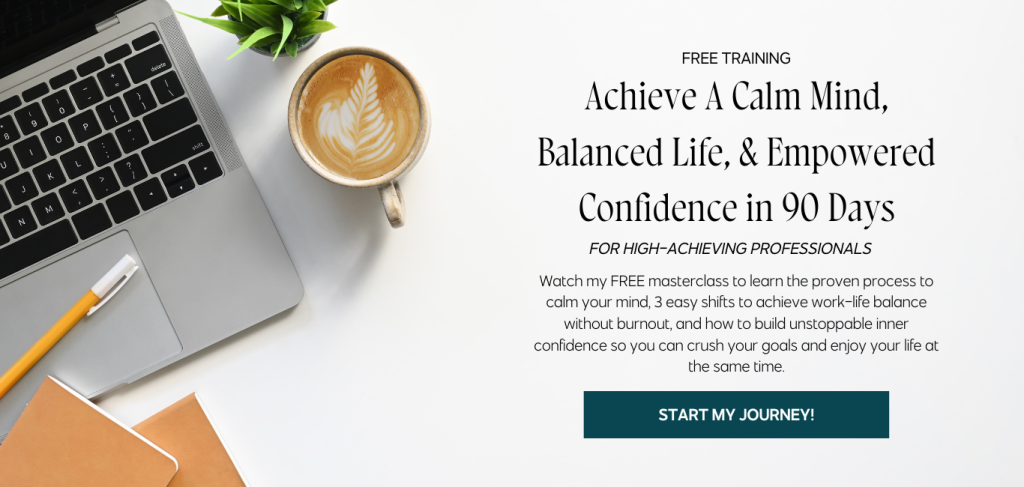
LISTEN, REVIEW, AND SUBSCRIBE TO THE PODCAST!
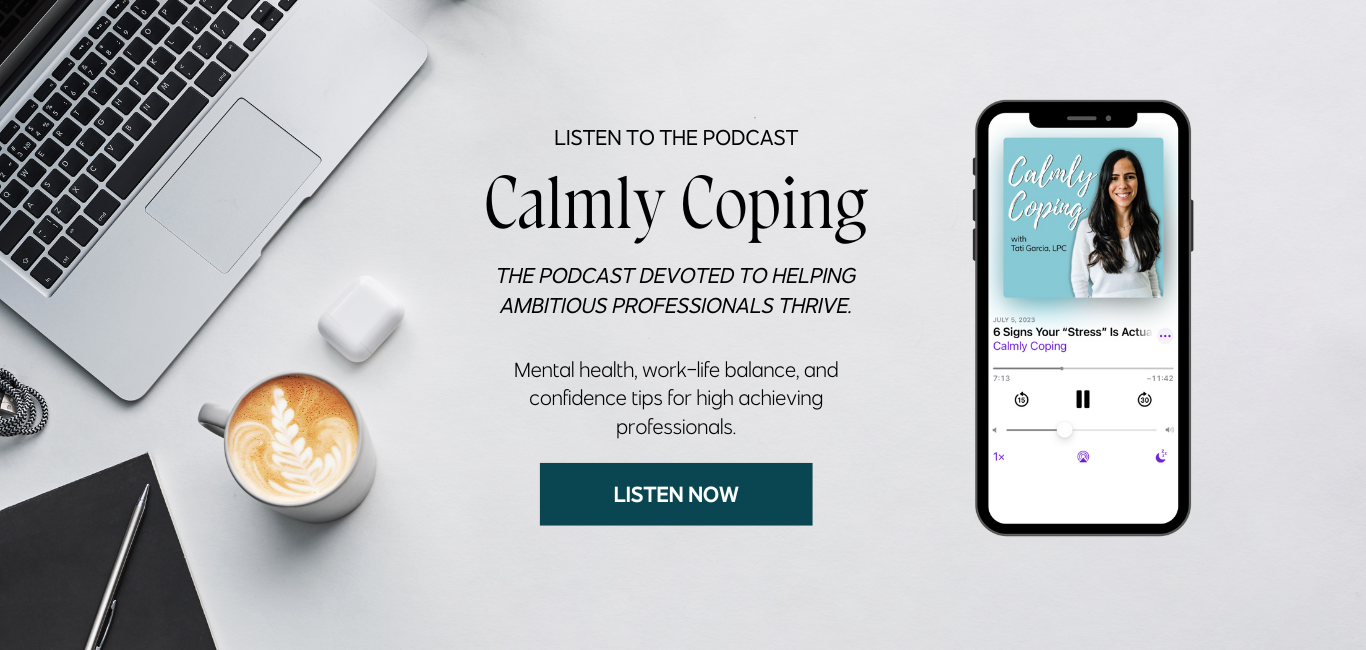
INTRO/OUTRO MUSIC: Rescue Me (Instrumental) by Aussens@iter (c) copyright 2018 Licensed under a Creative Commons Attribution (3.0) license. http://dig.ccmixter.org/files/tobias_weber/57990 Ft: Copperhead
DISCLAIMER: All content here is for informational purposes only. This content does not replace the professional judgment of your own mental health provider. Please consult a licensed mental health professional for all individual questions and issues.
Interested in diving deeper to get support for high-functioning anxiety?
I offer 1:1 coaching to help high-achievers overcoming high-functioning anxiety so they can feel calmer, more present, and have improved balance in their lives. Click here if you’re interested in learning more and getting started.
Calm, Balanced, & Confident is my comprehensive A→Z self-paced course to help high-achieving professionals overcome high-functioning anxiety so they can feel calmer, balanced, and more confident without the anxiety and overwhelm. Click here to learn more and enroll today.
Looking for ongoing support and guidance with high-functioning anxiety? The Calm & Ambitious Community is the exclusive community for high achievers with high-functioning anxiety. Click here to learn more and join us today!
TRANSCRIPT:
Click to view the episode transcript.
If you’re feeling overwhelmed, you’re in the right place. Overwhelm can be triggered by a high workload, emotional stress, life transitions, information overload, and perfectionism, just to name a few reasons. In today’s episode, I’m going to share practical tips and insights to help you navigate those intense feelings of overwhelm, regain your balance, and find your calm.
So grab your favorite drink, take a deep breath, and let’s dive in. Welcome to calmly coping. I’m your host, Tati Garcia. I’m a licensed therapist and a high functioning anxiety coach. Calmly Coping is the podcast for people who struggle with anxiety and high functioning anxiety. Each Wednesday, you’ll hear informative episodes with actionable tips about decreasing anxiety, adopting a healthy mindset and managing your time and energy so you can live a calm and balanced life.
Let’s get started.
Thank you so much for tuning in. Overwhelm is, quote, a state of being where an individual feels completely overcome by intense emotion or excessive stress.
So let’s dive straight into my tips to help you if you’re feeling overwhelmed. First is to identify what is triggering your feelings of overwhelm, because like I said in the introduction, it can be coming from a lot of different places. Maybe you have a lot of stuff on your plate, or maybe you are experiencing information overload, and you don’t have space or time to, you know, Allow your mind to wander and process all of the information you’re taking in.
Maybe it’s a big life change that you’re undergoing. And because of that, there are a lot of new things that you’re experiencing, or maybe a loss or exciting things that could also result in feeling overwhelmed. Maybe you’re feeling a lack of support. And then because of this, it feels like it all falls on you.
And. then you’re going to feel overwhelmed because maybe it’s more than you can handle. Now, when you identify the source of your overwhelm, then this can help give you a direction for what appropriate changes to make. I know this can seem like an obvious step. It’s something that many people often skip.
So let’s say if you have a busy schedule and you’re feeling really overwhelmed, maybe this can look like taking a mental health day off of work if you need the space and time to decompress and recharge. Or if you’re feeling overwhelmed by taking a lot in, maybe that is means reducing the information that you’re taking in, or if you’re going through a stressful time of your life or a transition, it could just mean acknowledging that it’s inherent when things are stressful, when a change is happening, that you may be in a situation.
state of overwhelm and stress, and to also maybe seek out support, whether that is emotional or psychological support, or whether that is support with doing the things that you need to do, asking for help. My second tip is to embrace the moment. silence. So I talked a lot about information overwhelm and nowadays we constantly have inputs going into our mind.
I have a whole podcast episode on the truth behind why you’re overwhelmed where I explain more about this that you can check out by clicking on the link in the description. And embracing silence doesn’t mean that you need to kind of like sit in a dark room and stare at a wall or anything like that, but it’s more about those moments when maybe you are traveling from place to place or.
Or maybe you might normally have the radio on if you’re driving or commuting, or maybe you tend to play a podcast while you do your chores. See if it’s possible to remove that, to allow yourself some space and time to process information in your mind to wander. So our minds just unconsciously will do this.
throughout our days when there is no input. So if you’ve ever noticed, maybe when you’re in the shower, that could be when your mind is having a coming up with ideas. Or maybe if you’re somebody who struggles with getting to sleep at night and you have all of these thoughts coming up, it could be because your mind hasn’t had the time to process or work through these things.
Or, you know, if it’s on the extreme end, maybe it’s more anxious thoughts, then that could be the kinds of thoughts that you’re having. But in general, it can be really helpful to have. moments of silence, moments of space, because this can quite literally reduce the noise and reduce the overwhelm that you’re taking in and give your brain time to process what it’s already taken in because our brains automatically do that.
So this tip can be helpful. My next tip is to be intentional with your media and entertainment consumption. A lot of times, let’s say when people have nothing to do, maybe you’re bored, maybe you’re stressed, you might reach for your phone, or you might turn on the TV and put things on just to have something to do, just to have something to watch, or just to be entertained in some way, there’s no real purpose or intention behind it, and everything that I share is all about balance, it’s not to vilify these things and say that it’s bad to watch TV or it’s bad to go on your phone or scroll through social media or whatever, but it’s about having a balance and being intentional with how you’re spending your time.
You don’t necessarily need to make decisions a hundred percent of the time, like I need to spend my time in this way, because that’s kind of leaning towards the end of rigidity. But then the other extreme of just having no boundaries and kind of going based on the Getting that instant gratification can also be potentially harmful to your mental health.
An article by the American Psychological Association, so the APA, has highlighted that media overconsumption can lead to stress, anxiety, and other mental health issues. So when I talk about being intentional with your media and entertainment consumption, that can look like setting boundaries. Or if you’re the kind of person who sits down and is like, Oh, I just want to watch something just to numb my brain.
And you’re constantly doing that. And it’s becoming something that is not necessarily adding to your life, but it’s just a way to pass the time. One tool that I have been using recently To be more intentional with my media consumption is Shortform. And this episode is kindly sponsored by Shortform.
Shortform makes the world’s best guides to non fiction books. Basically, they are like book summaries on steroids. And they get to the main points along with giving you exercise. And one thing that I love is that they will also give you what are called short form notes. And so they will take points from related books, maybe other books that they have done summaries on where similar topics have been discussed, or maybe expanding on certain topics and also expanding on certain research within those topics that the author is talking about.
So it’s not just limited to getting a summary on the book that you’re reading, but it’s also really a more comprehensive look at the topic. They cover many different genres, basically any genre you can think of where on non fiction books such as career and success, productivity, and self improvement.
I’ve recently checked out numerous books on short form. One that stood out to me was Dopamine Detox by Thibault Maurice. There are a few key lessons that I took away from this book. Essentially, a dopamine detox is when you do what I’m doing. sharing. So you kind of distance yourself from things that are going to trigger a release of dopamine.
And that is when we seek out the instant gratification, the reward from maybe getting a like on social media or seeing something that is novel and exciting. And the modern world is a media saturated environment full of passive entertainment, which constantly triggers dopamine. The problem is, and I’m going to read a quote from the short form summary, that constantly seeking the next sensory input leads to sensory overload, which prevents you from focusing on the work that matters most.
When you anticipate a pleasurable activity, dopamine is released. As more dopamine is released, your body needs an increased level of sensory input to release the same amount of dopamine. The impact, according to Maurice, is that you’re left constantly looking for the next sensory input. over stimulated, you become easily bored by low stimulation activities like focused work and incapable of the deep focus necessary to accomplish your long term goals.
This can be a negative impact of having too much information overload. And when we look at the concept that he shares that you might’ve heard before of a dopamine detox, it’s the intentional elimination of activity. activities that trigger dopamine to decrease sensory overload. So this can include looking at what are the things that you really crave and that you feel addicted to and that you can’t live without.
And is it possible to make changes to these habits that you might be unconsciously engaging in and then replacing them with something that is a healthier alternative. This can look like what he calls low stimulation activities like journaling, walking, gentle stretching or meditation. And even if you can just for a moment during your day, integrate some of these.
more low stimulation activities that can help to reduce those feelings of overwhelm and negative impacts to your mental health. Now the great thing about short form is that they publish new book guides and articles every week. And it’s a great way to also determine if there’s a book that you’re interested in that you might want to actually read, seek out and purchase.
And there is a special offer when you join short form through my link, shortform.com/tati that’s T A T I. You will receive a free trial of unlimited access and an additional 20 percent discounted annual subscription. Again, you can join short form by going to shortform. com slash Tati. My next tip is to write things down.
This kind of connects with what Thibault Maurice was saying in the dopamine detox book when he talked about journaling, but getting things out of your head can get it out of that swirl of like the way I think about it. It’s like this. soup of like things just constantly floating around and eating into each other.
And it can start to feel really overwhelming, especially if you’re somebody who tends to overthink things. So if you have a method of getting things out of your mind and onto paper or into a digital form that can help to reduce some of what your mind is holding onto, maybe your mind is holding onto these things because of certain emotions it is bringing up.
Maybe you’re feeling stressed or anxious. or sad or whatever it is that you might be feeling. Maybe it is holding onto it because you’re afraid of forgetting something. And so your mind feels like it constantly needs to play these things over and over in your mind. I’m talking about your mind as if it’s a separate thing from you, but hopefully you get what I’m saying.
So this can look like making to do lists, journaling. I talked about my five minute journaling technique for anxiety and overwhelm in episode 202, which you can check out at the link at the description. My next tip is to be kind to yourself and practice self compassion. It is okay to be feeling the way that you are.
We all go through these periods and certain times may be more intense than others. And when we try to escape or distract these feelings of overwhelm, it can often keep them sticking around longer. So the things that might feel uncomfortable immediately, like changing your Like, getting things out of your head and onto paper and really confronting these things that are bringing up feelings of overwhelm can actually be powerful in the long run and help to prevent you from getting into this place as severely next time around.
And just know that it’s okay. You’re not broken. And we all have our limits. The feeling is only temporary. I have limits when it comes to socializing. I tend to be an introvert. So I might start to feel more overwhelmed if I make a lot of plans and don’t have time to rest and recharge. I also have limits when it comes to meeting with clients.
I’ve determined what my max is per day for how many clients I can meet with. And I try to stick to that because I know that any more is going to be too much for me and I’m going to feel overwhelmed and I’m going to feel drained. So it’s all about determining what your personal limits are. There’s nothing wrong with having a limit.
The problem comes when you have the limit and you don’t know it. And so you continue to push yourself beyond the limit. Another tip is to get out of your head and into your body. And what I mean by this is that overwhelm often happens in our heads. We’re often thinking about things. So if you can bring the focus into your body, that can, automatically take the attention away from thinking and into calming your body, which is then going to create a feedback loop that could influence the way that you’re thinking about things.
So this can look like physical things like yoga or stretching or exercise, going for a walk or a run or going to the gym, whatever it is that you enjoy. Going for a hike recently. I’ve been getting into skating. So inline skating, rollerblading, and I like to go to the park and do that. Maybe doing some breath work.
It doesn’t have to be complicated. It could just be taking slow, deep breaths to release any tension, to calm your heart rate and to calm your body and mind. And also different grounding techniques can help you to get into your body. This can look like what’s called 1 grounding. So this is what are five things that you can see in the room around you?
What are four things that you can feel? And I like to encourage actually feeling the thing. So I have this velvet chair that I’m sitting on. So just getting in touch with the feeling and what it feels like when you’re doing it. Three is three things that you can hear. Two things that you can smell and one thing that you can taste and this is a really great technique.
I’ve used this with clients who are experiencing panic attacks and anxiety, but also just if you’re feeling overwhelmed or stressed and want to get better. into the moment. And my next tip is to say no. If you’re overwhelmed because you have too much on your plate, because you’re feeling overloaded, it’s okay to say no.
It can feel like something that’s difficult if you’re not used to it. But even if you just give yourself a pause, when somebody requests something from you, or if there’s a new opportunity, Giving yourself space to actually think, okay, do I have the time for this? I’ve been recently reading the book, slow productivity by Cal Newport.
And he gives a great tip where if you are adding something to your, like a new project or your to do list, where when you add this, you actually block out the time on your calendar for this. A lot of times when we add things to our plate, we’re not actually physically taking the time out and visualizing how much time that’s going to take.
Versus if you follow this practice of saying, okay, I’m adding this new thing to my plate and this is going to take one additional hour a week, or this is going to take one day next month or whatever it is, then that’s going to help you to actually assess how Do I have the time for this right now? Is this something that I can reasonably do?
And also keeping in mind those limits that you have. So maybe that can look like for me when it comes to socializing, all right, if I have a weekend packed with plans and I have no time to recharge, maybe I’m going to try and reduce the plans that I have, say no to something or make extra time to recharge somewhere else during the week or the weekend to ensure that I am taking that time to reduce.
Those feelings of overwhelm that I might have or feeling drained. So my action tip for this episode is to choose the tips that resonated with you the most and follow through with them. Let me know in the comments if you’re watching on YouTube or if you are listening on Spotify, what you thought and how you feel after implementing some of these tips.
While you wait for next week’s episode, I have other episodes about calming your mind, improving work life balance, and feeling more confident from within. Thank you so much for tuning in today, and until next time, be calm. Thanks so much for listening. If you like what you heard, please share this episode with a friend, and please subscribe and leave me a review on iTunes.
Also, remember to check me out online at CalmlyCoping. com and connect with me on Instagram at TatianaGLPC. All content here is for informational purposes only. This content does not replace the professional judgment of your own mental health provider. Please consult a licensed mental health professional for all individual questions and issues.
Till next time, I’m Tati, and this has been Calmly Coping.


Until next time…




